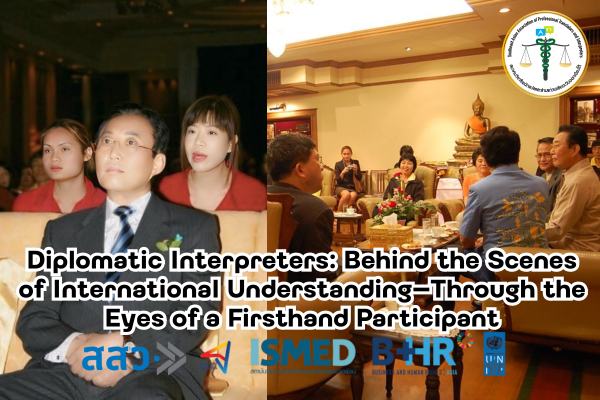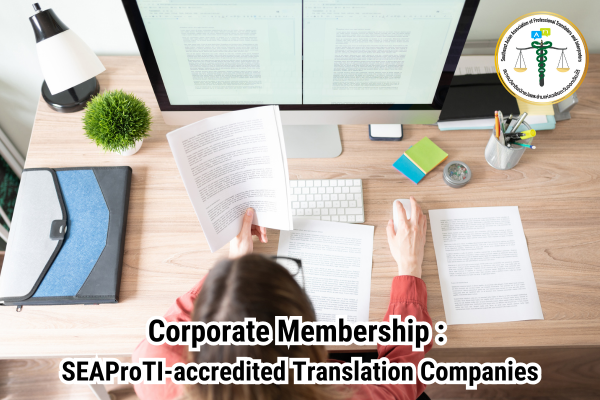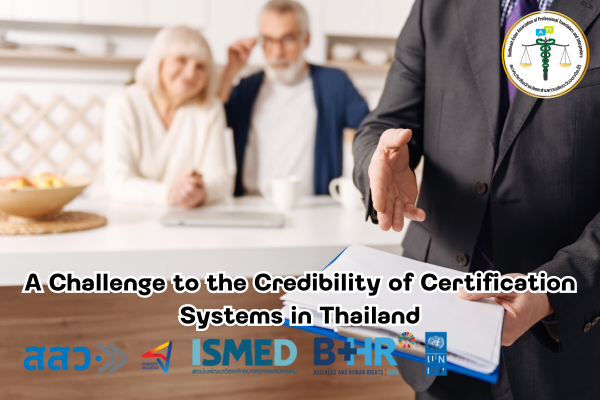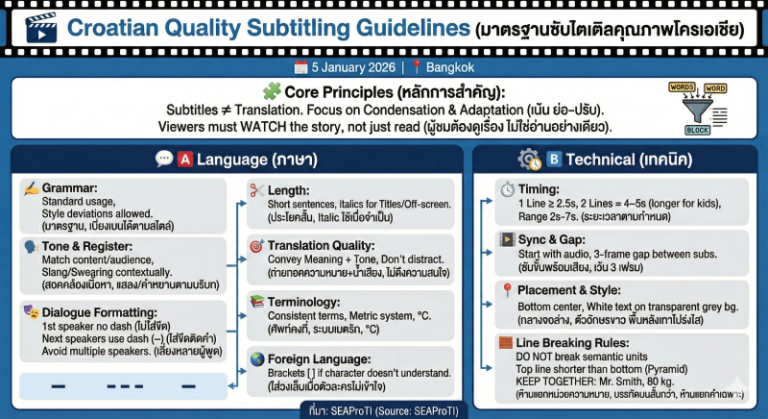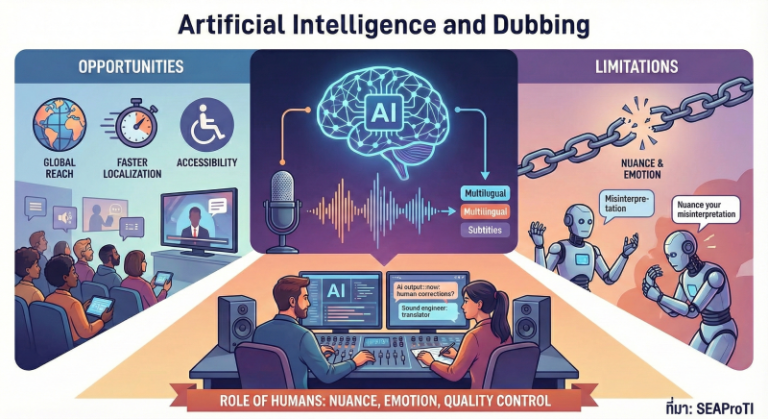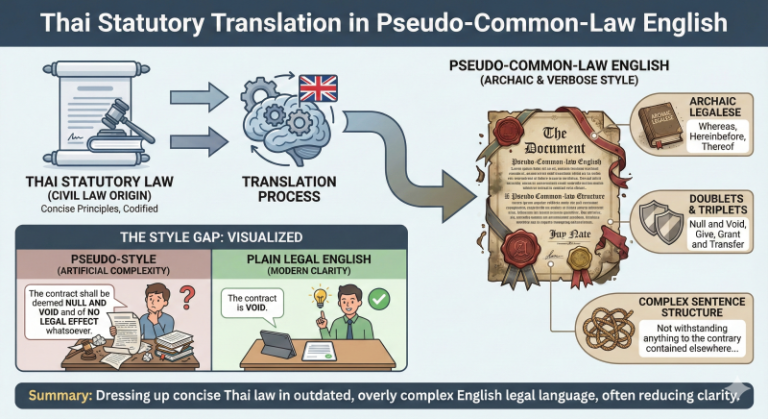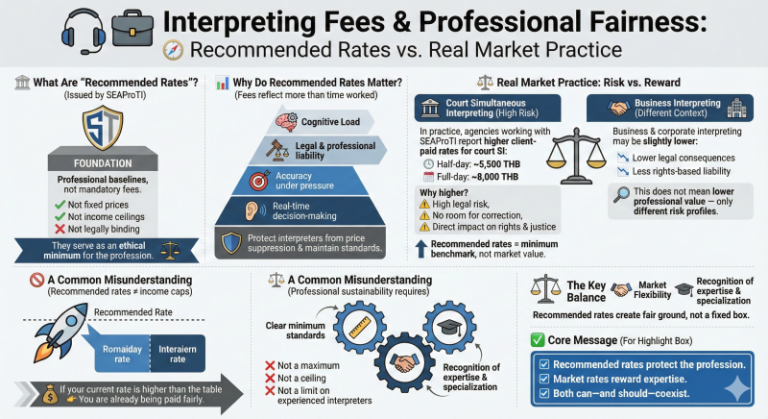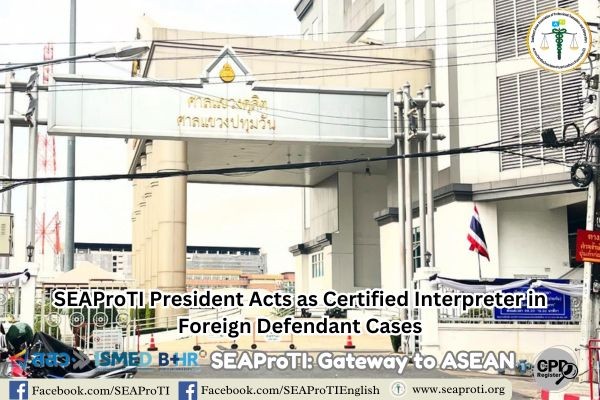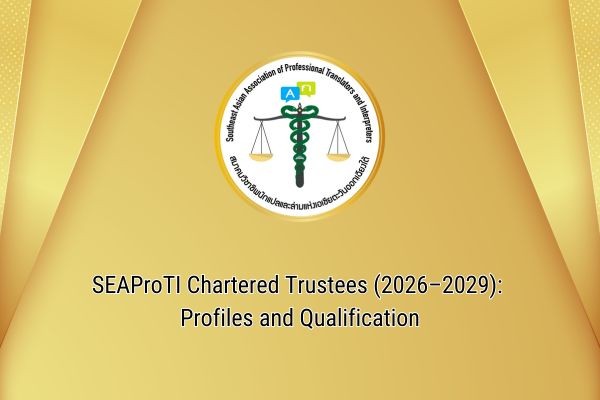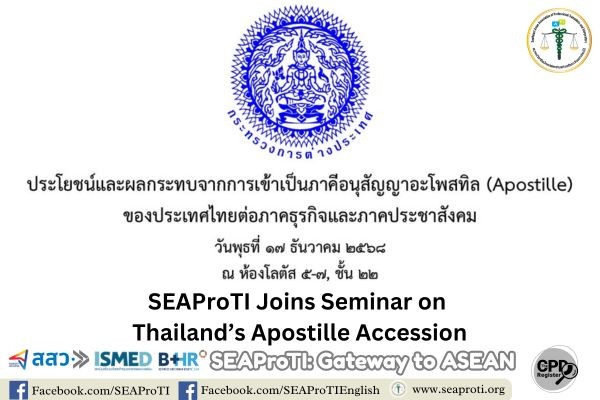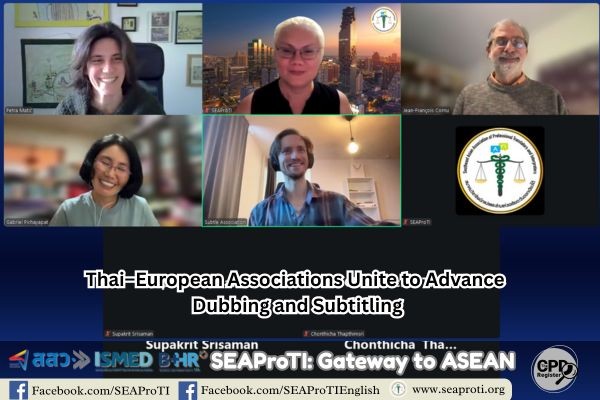Diplomatic Interpreters:
Behind the Scenes of International Understanding—Through the Eyes of a Firsthand Participant
June 3, 2025 | Bangkok – When we think of international relations, we often imagine diplomats, ministers, or heads of state. Yet behind the scenes of high-level negotiations lies another crucial figure—the diplomatic interpreter—a linguistic and cultural bridge who ensures that communication between nations flows smoothly and accurately.
In the era before language technology was widely available, interpreters relied entirely on their skills and deep contextual understanding. Especially in situations where no interpreter was available to work directly between Thai and Korean, relay interpreting became necessary. One interpreter would translate from Thai into English, and another would render the message from English into Korean. Although this method was more time-consuming, it was essential under such circumstances.
One memorable example occurred in 2004, when Khun Wanitcha Sumanat was honored to serve as the personal diplomatic interpreter for Mr. Goh Gun, former Prime Minister of the Republic of Korea, during his official visit to Thailand. He was invited to deliver a keynote speech on the topic of “Sufficiency Economy,” a Thai-born philosophy that South Korea would later adapt as a guiding principle for sustainable development.
Photographs from that event are more than just records of a diplomatic occasion; they reflect the vital role of interpreters as cultural mediators—those who make true understanding possible between nations.
Goh Gun and the Sufficiency Economy in South Korea:
When a Thai Philosophy Sparked Sustainable Progress
In the early 2000s, as the world began to focus more on sustainable development, South Korea, having rebounded strongly from the 1997 Asian financial crisis, began to revisit the foundations of its socio-economic growth.
A key figure who introduced Thailand’s “Sufficiency Economy” philosophy into South Korea’s policy discourse was Mr. Goh Gun (고건), former Prime Minister of the Republic of Korea. Known for his leadership in both political and policy arenas, Goh played a significant role in elevating this Thai concept to international attention.
In 2004, Goh traveled to Thailand to deliver a special lecture on the Sufficiency Economy, a philosophy initiated by His Majesty King Bhumibol Adulyadej (Rama IX) of Thailand. It promotes balanced development, internal resilience, and a careful, ethical approach to progress—one that resists the lure of unchecked growth.
Goh’s lecture resonated deeply with audiences across academic, economic, and political circles in South Korea. He emphasized that the Sufficiency Economy was not merely a moral vision but a practical tool for building a sustainable foundation. The principles of moderation, reasonableness, and self-immunity, combined with informed decision-making, offered a framework that could be meaningfully adapted beyond Thai borders.
Following his visit, various agencies in South Korea began to explore how this philosophy could align with Korean development models. It found its way into grassroots initiatives such as community enterprise support, environmentally balanced urban planning, and agricultural policies focused on self-reliance and resilience.
Former Prime Minister of the Republic of Korea
▫️ First term: March 4, 1997 – March 3, 1998 (Independent)
▫️ Second term: February 26, 2003 – May 25, 2004 (Millennium Democratic Party)
🔸 Also served as Acting President during the temporary suspension of President Roh Moo-hyun.
Interpreters: Not Just Language Conduits, but Cultural Stewards
The success of Mr. Goh’s keynote was made possible not only by his vision but also by the skilled interpreting that bridged language and meaning. Behind the scenes was Khun Wanitcha Sumanat, who served as his interpreter, employing a combination of whispered interpreting (chuchotage) and relay interpreting between Thai, English, and Korean—vital in a context where no direct Thai–Korean interpretation was available.
Her role went far beyond words. It involved conveying tone, cultural nuances, and diplomacy itself—elements that only a seasoned diplomatic interpreter can manage.
A Shared Intellectual Legacy Across Asia
More than two decades have passed, yet the conversation surrounding the Sufficiency Economy continues to influence global development policy. Mr. Goh’s endorsement of this philosophy serves as a reminder that Asian countries can learn from one another and build stable futures through regional models, rather than relying solely on Western paradigms.
A philosophy that began on Thai soil has since inspired regional transformation. And behind that transformation lies a powerful reminder: sometimes, the most significant changes begin with a simple conversation between two people who understand each other deeply, across languages and cultures.
SEAProTI’s certified translators, translation certification providers, and certified interpreters:
The Southeast Asian Association of Professional Translators and Interpreters (SEAProTI) has officially announced the criteria and qualifications for individuals to register as “Certified Translators,” “Translation Certification Providers,” and “Certified Interpreters” under the association’s regulations. These guidelines are detailed in Sections 9 and 10 of the Royal Thai Government Gazette, issued by the Secretariat of the Cabinet under the Office of the Prime Minister of the Kingdom of Thailand, dated July 25, 2024, Volume 141, Part 66 Ng, Page 100.
To read the full publication, visit: the Royal Thai Government Gazette
ล่ามทางการทูต: เบื้องหลังความเข้าใจระหว่างประเทศ ผ่านสายตาผู้ปฏิบัติหน้าที่จริง
3 มิถุนายน 2568, กรุงเทพมหานคร – เมื่อพูดถึงความสัมพันธ์ระหว่างประเทศ หลายคนอาจนึกถึงนักการทูต รัฐมนตรี หรือผู้นำประเทศ แต่มีอีกหนึ่งบทบาทที่มักซ่อนอยู่หลังม่านความสำเร็จของการเจรจาระดับสูง นั่นคือ “ล่ามทางการทูต” ผู้เป็นสะพานทางภาษาและวัฒนธรรม ที่ช่วยให้การสื่อสารระหว่างประเทศเป็นไปอย่างราบรื่นและแม่นยำ
ในช่วงเวลาที่ยังไม่มีเทคโนโลยีแปลภาษาเข้ามาช่วยเหลือมากนัก ล่ามต้องใช้ทักษะเฉพาะตัวและความเข้าใจในสถานการณ์อย่างลึกซึ้ง โดยเฉพาะในกรณีที่ไม่มีล่ามตรงระหว่างภาษาไทยและภาษาเกาหลี การล่ามแบบ “ส่งต่อ” (relay interpreting) จึงถูกนำมาใช้ กล่าวคือ ล่ามคนแรกจะแปลจากภาษาไทยเป็นอังกฤษ จากนั้นล่ามอีกคนจะแปลจากอังกฤษเป็นเกาหลี เป็นวิธีที่แม้จะใช้เวลามากขึ้น แต่ก็จำเป็นในบริบทนั้น
หนึ่งในเหตุการณ์ที่น่าจดจำคือ เมื่อปี พ.ศ. 2547 คุณวณิชชา สุมานัส ได้รับเกียรติให้เป็นล่ามทางการทูตประจำตัวของ ท่านโก ก็อน (Goh Gun) อดีตนายกรัฐมนตรีแห่งสาธารณรัฐเกาหลี ในโอกาสเดินทางเยือนไทยเพื่อบรรยายพิเศษในหัวข้อ “เศรษฐกิจพอเพียง” ซึ่งกลายเป็นแนวคิดที่เกาหลีใต้นำไปประยุกต์ใช้ในการพัฒนาอย่างยั่งยืน
ภาพถ่ายจากงานในวันนั้น ไม่ได้เป็นเพียงหลักฐานของเหตุการณ์ทางประวัติศาสตร์ แต่ยังสะท้อนถึงบทบาทสำคัญของล่ามในฐานะตัวกลางทางวัฒนธรรม ที่ทำให้ “ความเข้าใจ” เกิดขึ้นได้อย่างแท้จริงระหว่างสองประเทศ
ท่านโก ก็อน กับเศรษฐกิจพอเพียงในเกาหลีใต้: เมื่อแนวคิดจากไทยจุดประกายการพัฒนาอย่างยั่งยืน
ในช่วงต้นทศวรรษ 2000 โลกเริ่มหันมาให้ความสนใจกับแนวคิดการพัฒนาอย่างยั่งยืนมากขึ้น ท่ามกลางกระแสโลกาภิวัตน์และเศรษฐกิจเสรีที่เติบโตอย่างรวดเร็ว ประเทศเกาหลีใต้ หนึ่งในประเทศที่ฟื้นตัวจากวิกฤตเศรษฐกิจเอเชียปี 1997 อย่างแข็งแกร่ง ได้เริ่มหันกลับมาทบทวนรากฐานของการพัฒนาทางเศรษฐกิจและสังคม
หนึ่งในบุคคลสำคัญที่ผลักดันแนวคิด “เศรษฐกิจพอเพียง” จากประเทศไทยให้เข้าสู่บทสนทนานโยบายในเกาหลีใต้ คือ ท่านโก ก็อน (Goh Gun / 고건) อดีตนายกรัฐมนตรีแห่งสาธารณรัฐเกาหลี ผู้มีบทบาทโดดเด่นทั้งในแวดวงการเมืองและการวางนโยบายระดับชาติ
ในปี พ.ศ. 2547 ท่านโก ก็อนได้เดินทางเยือนไทยอย่างเป็นทางการ เพื่อบรรยายพิเศษในหัวข้อ “เศรษฐกิจพอเพียง” ซึ่งเป็นแนวพระราชดำริของพระบาทสมเด็จพระเจ้าอยู่หัว รัชกาลที่ 9 ที่มุ่งเน้นการพัฒนาที่สมดุล มีภูมิคุ้มกัน และไม่หลงใหลไปกับการเติบโตที่ไม่มีจุดหยุด
การบรรยายครั้งนั้นสร้างแรงกระเพื่อมในวงวิชาการ เศรษฐกิจ และการเมืองของเกาหลีใต้ ท่านโก ก็อน ได้ชี้ให้เห็นว่า “เศรษฐกิจพอเพียง” ไม่ใช่เพียงแนวคิดเชิงจริยธรรม แต่เป็นเครื่องมือที่มีศักยภาพในการวางรากฐานของการพัฒนาที่ยั่งยืน โดยเน้นความพอประมาณ การมีเหตุผล และการมีภูมิคุ้มกันในตัว รวมถึงการใช้ข้อมูลอย่างรอบด้านเพื่อการตัดสินใจ
หลังจากการเดินทางครั้งนั้น หลายหน่วยงานในเกาหลีใต้ได้นำหลักการของเศรษฐกิจพอเพียงไปวิเคราะห์เปรียบเทียบกับโมเดลการพัฒนาของเกาหลีในอดีต และปรับใช้ในโครงการระดับท้องถิ่นที่ต้องการสร้างความเข้มแข็งจากฐานราก เช่น โครงการส่งเสริมวิสาหกิจชุมชน การพัฒนาเมืองที่เน้นสมดุลสิ่งแวดล้อม และนโยบายสนับสนุนเกษตรกรรมที่เน้นการพึ่งตนเอง
เกี่ยวกับ ท่านโก ก็อน (Goh Gun / 고건)
อดีตนายกรัฐมนตรีแห่งสาธารณรัฐเกาหลี ดำรงตำแหน่งนายกรัฐมนตรี 2 สมัย:
▫️ ครั้งแรก: 4 มีนาคม 1997 – 3 มีนาคม 1998 (ไม่สังกัดพรรคการเมือง)
▫️ ครั้งที่สอง: 26 กุมภาพันธ์ 2003 – 25 พฤษภาคม 2004 (รัฐบาลพรรคสหัสประชาธิปไตย)
เคยดำรงตำแหน่ง รักษาการประธานาธิบดี ชั่วคราวในช่วงที่ประธานาธิบดีรูห์ มูฮยอน ถูกพักงาน
ล่ามทางการทูตไม่ใช่เพียงผู้แปลภาษา แต่คือผู้ตีความความหมายที่ซ่อนอยู่เบื้องหลังถ้อยคำ ด้วยความเข้าใจในวัฒนธรรม มารยาททางการทูต และบริบทระหว่างประเทศอย่างลึกซึ้ง เป็นฟันเฟืองเล็ก ๆ ที่ขับเคลื่อนความสัมพันธ์ระหว่างประเทศให้ก้าวไปข้างหน้า
บทบาทของล่ามทางการทูต: เมื่อความเข้าใจมิใช่แค่ภาษา แต่คือวัฒนธรรม
การบรรยายของท่านโก ก็อน ในครั้งนั้นได้รับความสนใจจากผู้ฟังหลากหลายภาคส่วน และเบื้องหลังความสำเร็จของการสื่อสารระหว่างสองภาษา คือบทบาทของล่ามทางการทูตซึ่งทำหน้าที่ถ่ายทอดไม่เพียงถ้อยคำ แต่รวมถึงอารมณ์ บริบท และคุณค่าทางวัฒนธรรม
คุณวณิชชา สุมานัส ได้รับเกียรติให้ปฏิบัติหน้าที่ล่ามทางการทูตประจำตัวท่านโก ก็อน โดยใช้เทคนิคการล่ามแบบกระซิบและล่ามส่งต่อ (relay interpreting) ระหว่างภาษาไทย–อังกฤษ–เกาหลี เพื่อให้การสื่อสารเป็นไปอย่างแม่นยำในสถานการณ์ที่ไม่มีล่ามที่สามารถแปลตรงจากไทยเป็นเกาหลีโดยตรง
มรดกทางความคิดที่เชื่อมโยงเอเชีย
แม้เวลาจะผ่านมากว่าสองทศวรรษ บทสนทนาเรื่องเศรษฐกิจพอเพียงยังคงมีพลังอยู่ในเวทีนโยบายระดับโลก และการที่บุคคลระดับผู้นำอย่างท่านโก ก็อน ให้ความสำคัญกับแนวคิดนี้ ก็สะท้อนให้เห็นว่า ประเทศในเอเชียสามารถเรียนรู้ซึ่งกันและกัน และร่วมกันออกแบบอนาคตที่มั่นคงได้ โดยไม่จำเป็นต้องลอกเลียนแบบโมเดลของตะวันตกเสมอไป
แนวคิดที่เริ่มต้นจากแผ่นดินไทย ได้กลายเป็นแรงบันดาลใจระดับภูมิภาค และเรื่องราวเบื้องหลังนี้ เตือนใจเราว่า การเปลี่ยนแปลงที่ยิ่งใหญ่บางครั้งก็เริ่มจาก “บทสนทนา” ระหว่างคนสองภาษา ที่เข้าใจกันอย่างแท้จริง
เกี่ยวกับนักแปลรับรอง ผู้รับรองการแปล และล่ามรับรองของสมาคมวิชาชีพนักแปลและล่ามแห่งเอเชียตะวันออกเฉียงใต้
สมาคมวิชาชีพนักแปลและล่ามแห่งเอเชียตะวันออกเฉียงใต้ (SEAProTI) ได้ประกาศหลักเกณฑ์และคุณสมบัติผู้ที่ขึ้นทะเบียนเป็น “นักแปลรับรอง (Certified Translators) และผู้รับรองการแปล (Translation Certification Providers) และล่ามรับรอง (Certified Interpreters)” ของสมาคม หมวดที่ 9 และหมวดที่ 10 ในราชกิจจานุเบกษา ของสำนักเลขาธิการคณะรัฐมนตรี ในสำนักนายกรัฐมนตรี แห่งราชอาณาจักรไทย ลงวันที่ 25 ก.ค. 2567 เล่มที่ 141 ตอนที่ 66 ง หน้า 100 อ่านฉบับเต็มได้ที่: นักแปลรับรอง ผู้รับรองการแปล และล่ามรับรอง


